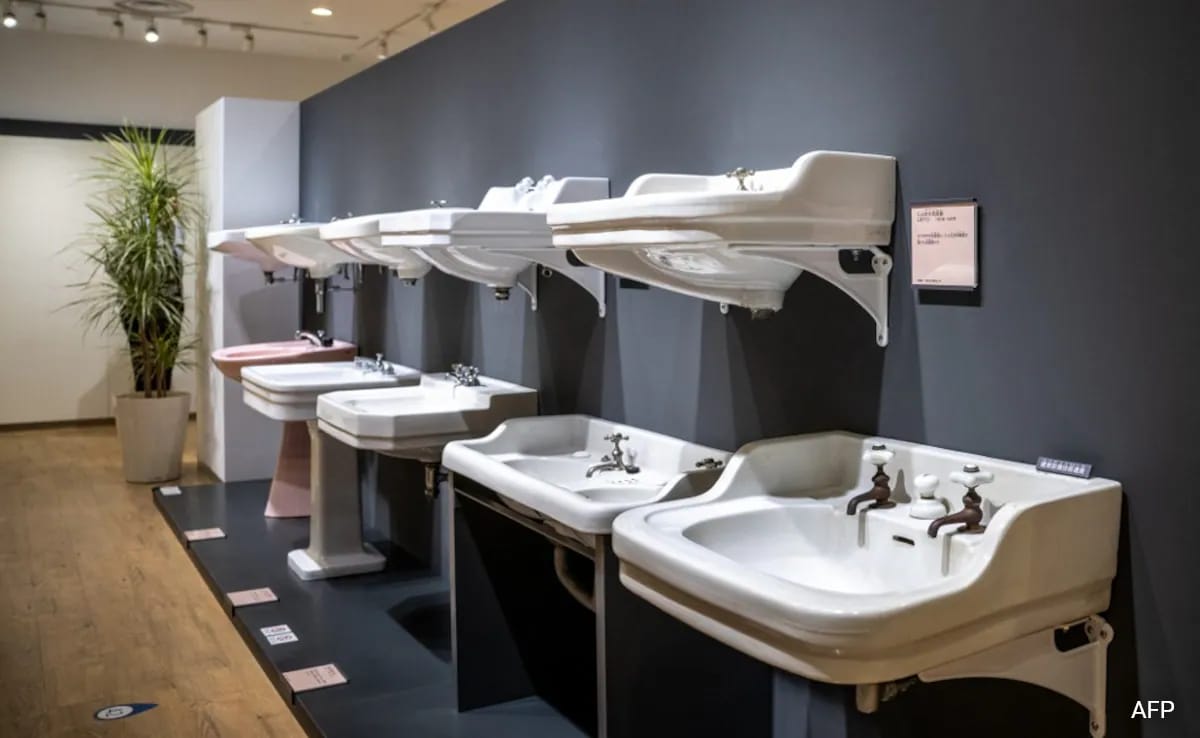Kitakyushu, Japan:
As Japan plays host to a record influx of tourists, one of the country’s more private attractions – the high-tech toilet – is becoming a must-have in luxury bathrooms around the world.
With their warm seats and precision spray technology, bidet toilets are the norm in Japan, where more than 80 percent of homes have one, according to a government survey.
Now sales are surging abroad and especially in the United States, led by A-list bidet fans like Drake, the Kardashians and Alexandria Ocasio-Cortez.
Japanese company TOTO, which pioneered the electric bidets, claims they have created “a global revolution from wiping to washing”, saying foreign revenues for toilets have roughly doubled from 100 billion yen ($673 million) in 2012.
The pandemic was a major driver, bringing a boom in home renovations but also germ-conscious consumers desperate for an alternative to toilet paper after shelves were emptied by panic buyers.
Senior TOTO director Shinya Tamura, who oversees international business, told AFP the brand’s growth was a word-of-mouth success.
When people first learn how the toilet water jets work, with pressure and temperature control, “there’s an image that it’s not pleasant.”
But “we can’t explain in words how good it is. You have to experience it,” Tamura said.
“After a while, most users can’t live without it.”
The housing equipment company’s international net sales are currently less than a third of those in Japan.
It wants to increase sales in America by 19 percent in two years to ‘acquire a solid position’ there and compensate for less urgent demand in China.
But with more people looking for squeaky clean butts, American competitors are challenging TOTO and its Japanese rivals such as Panasonic and LIXIL for their throne.
‘Smartest toilet’
At a major technology fair in Las Vegas this year, the marketing manager of American brand Kohler called the Numi 2.0 – which receives voice instructions via a built-in Amazon Alexa – ‘the smartest toilet around’.
Like the Japanese top models, the Numi 2.0 has an automatic deodorant and a motion-activated lid that opens when you enter the bathroom and closes when you leave.
The spray lance has pulsating and oscillating functions and users can adjust the warm air dryer down to the smallest details.
But such indulgence comes at a price: about $8,500 to $10,000, compared to about $500 for more basic bidet seats.
Americans who travel to Japan are often inspired to upgrade their toilets, a salesperson at Ardy’s Bath Collection in Beverly Hills told AFP.
“They see it at the airport, and they see it in public restrooms, and they use it, and they say, ‘wow, this is great,’” he said.
Bidets are “popular everywhere,” but they are still a “private experience” and “weird to talk about” for some customers.
Although fancy Japanese-style toilets are fast becoming a status symbol, TOTO executives have long battled squeamishness in their efforts to expand abroad.
After the US launch of the Washlet bidet in 1986, the company had difficulty placing ads, and the pop-up event was banned from an upscale shopping center because other stores complained.
“Does it hurt?”
How things have changed in the share-all internet era.
“Why am I nervous? Does it hurt? Is it cold?” 21-year-old Canadian Spencer Barbosa, who has 10 million TikTok followers, said in a video of her trying a Japanese toilet.
Superstar rapper Drake made a grand public gesture by gifting his friend DJ Khaled with luxury TOTO-loos in 2022.
And US Congresswoman Ocasio-Cortez joked in an Instagram video last year that she was shopping for a bidet after going to Japan because “life will never be the same.”
Funny enough, when TOTO first started selling bidets to hospitals in Japan, it imported them from the United States, but users complained that the power was unstable.
The company was founded in 1917 when father and son from a wealthy business family tried to bring Western-style ceramic toilets to Japan.
Because sewage systems were undeveloped and squat toilets were common, the company struggled, so they relied on selling tableware until habits began to change after the 1970 Osaka World’s Fair, said Junichi Koga, head of TOTO’s history museum.
More than 300 employees helped develop and test the Washlet by indicating their preferred location for the water jet.
Now TOTO has sold 60 million Washlets worldwide – featured in episodes of “The Kardashians” and “South Park,” in which the company was parodied as “TOOTTOOT.”
As the bidet craze grows, even the fearful may be converted over time, the Ardy’s salesperson said.
He advises customers to install the necessary electricity when remodeling their bathroom, telling them, “You can always buy it later.”
(Except for the headline, this story has not been edited by NDTV staff and is published from a syndicated feed.)










